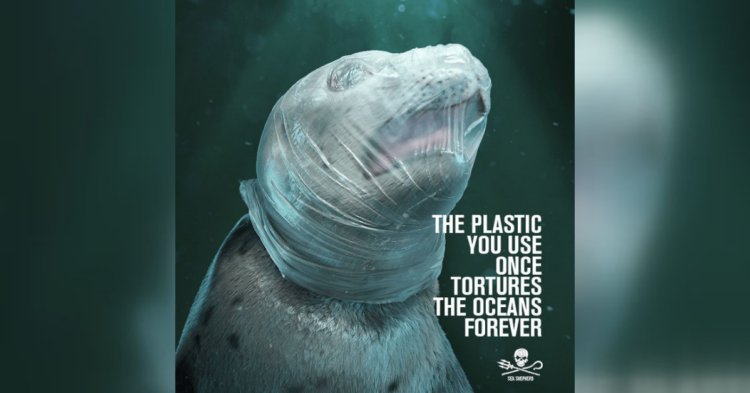What do you do when an issue desperately needs increased awareness, but nobody seems to be taking note? Sometimes the best thing to do is to grab somebody’s attention. That’s just what an ocean advocacy group is doing when it comes to oceanic pollution — and it’s incredibly effective.
Sea Shepherd is well known around the globe.

A marine conservation organization formed by Paul Watson in 1977, Sea Shepherd has attracted controversy in the past for the ways in which they seek justice. These methods tend to involve taking direct action.
They’ve taken direct action in the past.

One of their most frequent targets has been the Japanese whaling industry. Despite an international outcry, whaling is still practiced in Japan — and members of Sea Shepherd have been accused of harassing these whalers.
Their influence has grown.

If you need any evidence of this, just consider the fact that it has its own fleet of nine ships, dubbed Neptune’s Navy . You can see their ship, the MY Steve Irwin , in the pic above.
Not all of their advocacy is so direct, though.

On the issue of plastics polluting the world’s oceans, just about everybody is guilty. It requires a PR campaign rather than direct action, and Sea Shepherd has found a powerful response.
They’ve created this imagery.

It’s dramatic art — in this case, it depicts a panicking otter helplessly trying to escape as it suffocates on a plastic bag. It’s an effective way to bring the issue to the forefront.
It’s a major issue.

“Scientists warn that in 2050 there will be more plastic in the oceans than fish in the sea,” said Paul Watson, concluding, “Sea Shepherd is committed to preventing this from happening – because if the oceans die, we die.”
It’s part of a big campaign.

While only two posters have been released, the PR campaign is just one of several facets of Sea Shepherd’s strategy when it comes to cleaning the oceans of plastic.
It’s tied to other initiatives.

Sea Shepherd’s own Operation Clean Waves is an effort to manage the threat, assess the damage that’s already been done, and move forward with an approach that prevents further harm.
It’s an issue that requires everyone’s cooperation.

We’ve all used single-use plastics without thinking about where they go when we’re done with them. We can’t go back and change what’s already been done, but we can make meaningful changes moving forward.
Imagery is important.
“Unfortunately, a small and thoughtless action in our daily life can cause huge damage to nature without us even realizing it,” said Guiga Giacomo, the director of the agency that created Sea Shepherd’s posters.
It demands a response.

“In this campaign, we aim to remedy this by reaching the largest number of people possible, bringing awareness to the fact that with small and easy steps, we can ensure that terrible scenes like these do not happen,” explained Giacomo.
We need to be better to our marine friends.

About 100,000 marine creatures are found dead every year because they’ve become entangled in plastic. These are just the ones that are found and counted, however — the true numbers are likely much higher.
Plastic takes forever to degrade.

Well, not forever , exactly, but it does take a long, long time. Compounding matters is the face that as it breaks down, it forms smaller particles, which can be more harmful to animals.
We’ll see if the campaign is effective.

It seems like it would be hard not to take notice of something so powerful. But then again, creating meaningful change across all of society is a seriously tall order. What do you think?
h/t: Sea Shepherd

















































